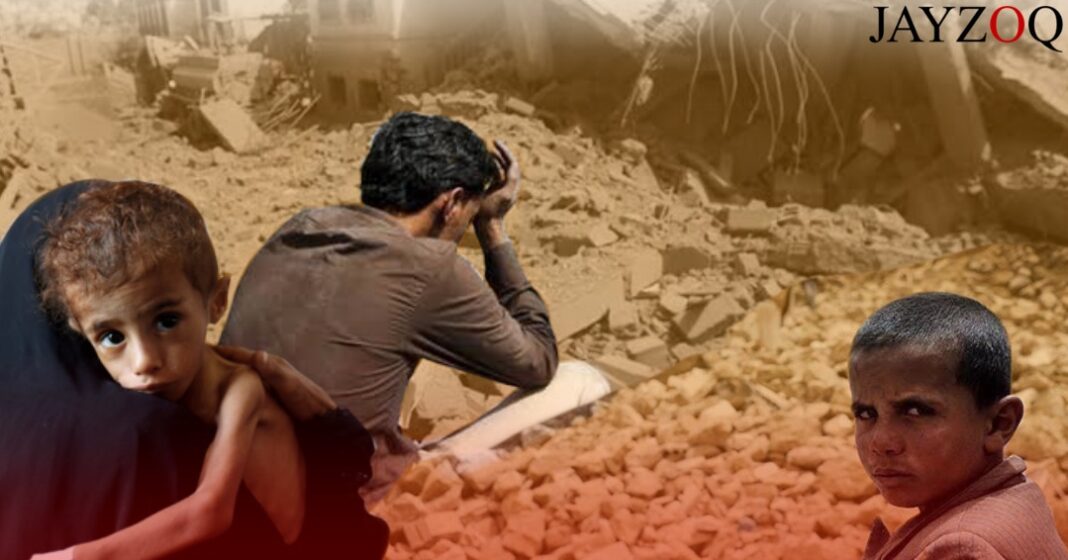Yemen: As of March 2020, UNICEF estimates that 2 million children under the age of 5 suffer from acute malnutrition and require treatment. In October 2018 the United Nations alerted that 13 million people face starvation in what could be “The worst famine in the world in 100 years.
Yemen is undergoing the worst humanitarian crisis ever imaginable with an ongoing civil war since 2015. Overshadowed by the war in Syria and Iraq this bloody conflict has its roots in the failure of a political transition which was supposed to bring stability in the region. It resulted from a spring of uprisings which forced its longtime authoritarian president, Ali Abdullah Saleh to hand over power to his deputy, Abdrabbuh Mansour Hadi in 2011. President Hadi struggled to deal with a variety of problems including an attack by jihadists, a separatist movement operating in the south, as well as continuing loyalty of security personnel to Saleh. Corruption charges and unemployment rates continued to increase, leading to food insecurity which meant more instability in the region. This instability and power vacuum left by the removal of Saleh led to civil unrest and more separatist jihadist groups to move in the area.
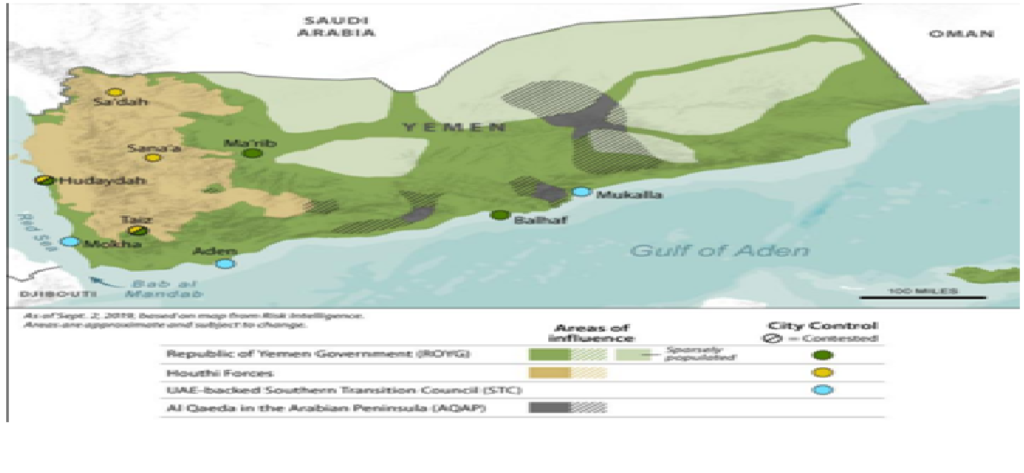
Picture taken from: Congressional Research Service Article
Source: Graphic created by CRS using data from risk intelligence (2019); ESRI (2017&2018); NOAA (2018); USGS
(2018); Department of State (2015)
The civil war in Yemen erupted in 2015 when The Houthi movement (formally known as Ansar Allah), a Shiite group backed by Iran, took up arms in attempts to overthrow the government of Yemen which was predominantly Sunni. The Houthis complain that the government has discriminated against them for years. Mistreating them on a large scale that now their fight is a struggle to be treated fairly. Iran is known to be backing up The Houthis by providing them with arms and money, thereby helping them fight a series of rebellions against the former government of Saleh during the previous decade. It took advantage of the new president’s weakness by seizing control of their northern heartland of Saada province and neighboring areas. Disillusioned by the transition in power, many Yemenis, including Sunnis, supported the Houthis and in late 2014 and early 2015, took over the capital Sanaa. The Houthis and security forces loyal to Saleh attempted to take charge of the entire country, forcing Mr. Hadi to flee abroad in March 2015.
The former government of Mr. Hadi backed by a coalition of 10 predominantly Sunni Nations, including neighboring Saudi Arabia and therefore, by the United States, began an air campaign aimed at vanquishing the Houthis, ending Iranian influence in Yemen and restoring Mr. Hadi’s government. Many experts see the involvement of Saudi Arabia as the latest front in the shadow war between Iran and Saudi Arabia for influence and control over the entire region. Iran and Saudi Arabia have been forging these deadly proxy wars since the late 20th century leading to a cold war in the middle east. Their goal is set to establish themselves as the leaders of the Islamic nations. On one side Iran is predominantly Shia, while on the other, Saudi Arabia is predominantly Sunni. The Saudi-Iranian rivalry has become a fight over influence and the whole region has become a battlefield. This fight over influence has led them to support opposite sides of groups in failing states like Yemen, Iraq, and Syria. With no regard towards human life, these two giants, in trying to secure their position as the head of the Islamic Ummah, have committed genocides and mass civilian casualties in the region. However, in Yemen, this conflict over influence has resulted in the most excruciating humanitarian crisis one could think of.
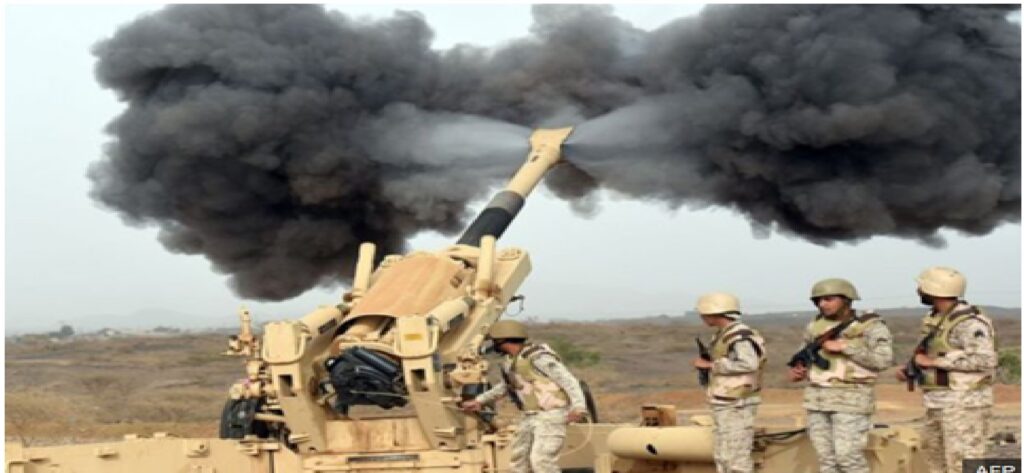
Picture taken from: BBC
A Saudi led multinational coalition intervened in the conflict in Yemen in March 2015
The civil war in Yemen has given birth to the worst famine ever in the last 100 years according to the UN. In attempts to secure the Houthi-controlled territory, the coalition troops led by Saudi Arabia have resorted to airstrikes which have resulted in more than 60% of civilians dying. Saudi airstrikes are deliberately targeting the civilian population and have been accused by the UN of committing war crimes as they continue to target civilians and their means of sustenance. Saudi Arabia was reported to be intentionally targeting means of food production and distribution in Yemen by bombing farms, fishing boats, ports, food storages, food factories, and other businesses in attempts to exacerbate a famine in the region. With no regard for human life, Saudi Arabia continues to bomb Yemen in attempts to secure the former government of Mr. Hadi and force the Houthis out of the region. 1500 schools have been damaged and destroyed in Yemen as well, with both sides Iran and Saudi Arabia committing the worst of atrocities across the region.
The famine in Yemen is soon going to reach biblical proportions as Saudi Arabia continues to tighten its land, sea, and air blockade letting very limited foreign aid reach the people in need. There were reports that the Saudis had eased the blockade however some independent sources have denied that and the threat of the famine in Yemen keeps rising. Over 17 million of Yemen’s population is at risk; approximately over 3.3 million children and pregnant or lactating women suffer from acute malnutrition. The famine has resulted in over 85,000 children starving to death and this only an estimated figure by the World Health Organisation. The real number of deaths of children by starvation could be much, much higher than this. In November of 2017, the estimated deaths of children per day were somewhere around 130. 130 children in Yemen were starving to death every day and reports suggest that those numbers have only been rising since that estimation in 2017. In 2019 The British researcher Alex de Waal stated the famine in Yemen as, “The world’s worst since North Korea in the 1990s and the one in which western responsibility is clearest”.Britain has sold at least£4.7 billion in arms to Saudi Arabia and £860 million to its coalition partnerssince the war began. The US role is even bigger: Trump authorized arms sales to the Saudis worth $110 Billion in 2017 and $350 Billion over 10 years. Yemen will be the defining famine crisis of this generation, perhaps this century.

A severely malnourished boy rests on a hospital bed at Aslam Health Centre, Hajjah Yemen
Both sides Saudi Arabia and The Houthis are manifesting the worst of atrocities across the region to gain some leverage over the other side. Weaponisation of water through siege and blockades is a tactic both sides in the conflict have readily employed in attempts to strengthen their leverage. Constraining foreign aid and mismanagement of distribution of aid has led to the UN fearing a mass famine event. As Saudis continue to bomb Yemen, reports have suggested that Saudi airstrikes are purposely targeting water sanitation plants and hospitals with officials in Yemen reporting less than 45% of the health care system functioning in the country. The decimation of Yemen’s water and sanitation infrastructure has created one of the worst health epidemics the country has ever experienced.
Approximately 19.3 Million Yemenis are without access to clean water and sanitation leading to the worst cholera outbreak in the region. Yemen authorities announced the cholera outbreak on 6 October 2016 and by the end of that year, there were 96 deaths. Fortunately, the outbreak was in a steady decline at the start of 2017 but it resurged back in May of 2017 with a second wave and it has been labeled by the UN as the worst cholera epidemic of the century. In May of 2017, 74,311 suspected cases, including 605 deaths were reported. By June UNICEF and WHO estimated that 5,000 new cases per day were occurring and that the total number of cases in the country since the outbreak began in October had exceeded 200,000, with 1,300 deaths. The two agencies stated that it was then “the worst cholera outbreak in the world.” On 22 December 2017, the World Health Organisation reported the number of suspected cholera cases in Yemen had surpassed one million. In 2018 deaths by cholera reached 2,500, with 58% being children and according to the UN this Cholera outbreak is the worst epidemic in recorded history. Although cases have reduced dramatically in 2018, the UN says it is concerned about a possible “third wave” of the epidemic which can be even more deadly than the last two.
For Yemenis afflicted by cholera, lack of sanitation is only part of the issue. Poor access to health care services compounds the effects of the pandemic. This lack of proper health care has led to thousands of Yemenis dying due to preventable diseases. Saudi airstrikes are morbidly targeting Yemeni hospitals with the latest attacks on 7 February 2020, leaving more than thousands of civilians in need of immediate medical attention followed by a disrupted healthcare system. This disruption of healthcare systems could pose to be an even bigger threat as the COVID 19 pandemic surges across the globe. Yemen is seen to be extremely vulnerable to the outbreak, given the dire humanitarian situation due to the Yemeni Civil war, exacerbated by the ongoing famine, cholera outbreaks, and military blockade by Saudi Arabia and its allies. With very minimal healthcare facilities functioning properly across the nation this threat of the COVID 19 pandemic could reach to extreme proportions and can result in the worst outbreaks in the whole world if not dealt with swiftly. However, this pandemic could also work in favor of the country as the global COVID 19 pandemic is said to have given Saudi Arabia an opportunity to review its interests in Yemen. It is said that Saudi Arabia is searching for an exit strategy, believing that the COVID 19 pandemic can make it look like a humanitarian gesture instead of a surrender.
Saudi led intervention in Yemen has only come with negative and deadly outcomes. With an ongoing famine and the worst cholera epidemic in the country, chaos and destruction was at its peak when Saudi Arabia started conducting airstrikes across the region in attempts to secure Mr. Hadi’s government which in turn was also backed by Saudi Arabia. This intervention in Yemen has resulted in the worst humanitarian crisis ever imaginable and possibly the worst in recorded history with more than 80% of the population suffering from extreme poverty, food shortages, and no access to clean drinking water resulting in more deaths by starvation and preventable diseases. There is no way the Houthis could’ve posed a threat even close to what the Saudis have done in Yemen. Limiting foreign aid, committing mass genocides on both sides Iran and Saudi Arabia have no regard for human life. The worst of war crimes are being committed in Yemen yet no one is talking about it. Press is only limited overshadowed by the wars in Syria and Iraq yet the world’s deadliest conflict is being played out in Yemen and the majority of the people have no idea about it. Yemen is bleeding in front of our eyes, hundreds of people are dying every day including women and children as a result of this war. A war of influence over Islamic nations but the extreme foundation of Islam is continuously being tarnished in attempts to gain leverage over one another.
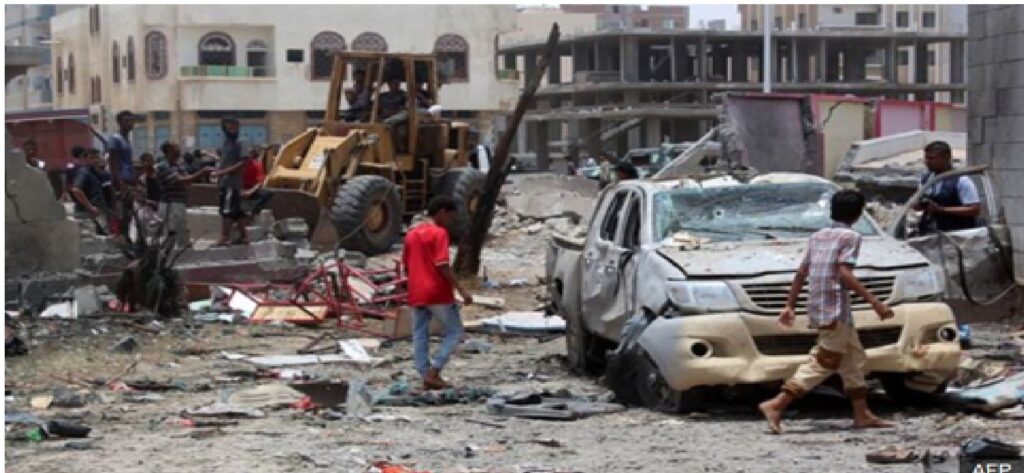
Picture taken from: BBC
Suicide bombings claimed by the Islamic State group has killed dozens of people in Aden
We are robbing the children of Yemen of their future. We are infringing upon their basic human rights. The Yemen crisis is a proof of how humanity has failed and it’s time we end this inhumanity, it’s time we take this from social media and magazine articles to the real world and do something because this isn’t a debate anymore, something needs to be done and done soon before it’s too late. UNICEF is on the ground to save children’s lives, to help them cope with the impact of conflict, and to help them to recover and resume their childhood. Donations to Yemen will help end this inhumanity by preventing this humanitarian crisis from reaching unfathomable levels. Donate to reliable sources such as UNICEF, MSF, IRC, and the ICRC who have teams available on the ground in Yemen reaching out to the most impoverished and affected regions across Yemen. It’s a heart wrenching humanitarian crisis with very limited coverage. Yemen needs our help; it needs more coverage. People need to know about all the atrocities being carried out in Yemen and I encourage you to please spread awareness. All those responsible for the worst war crimes being carried out in Yemen need to pay.
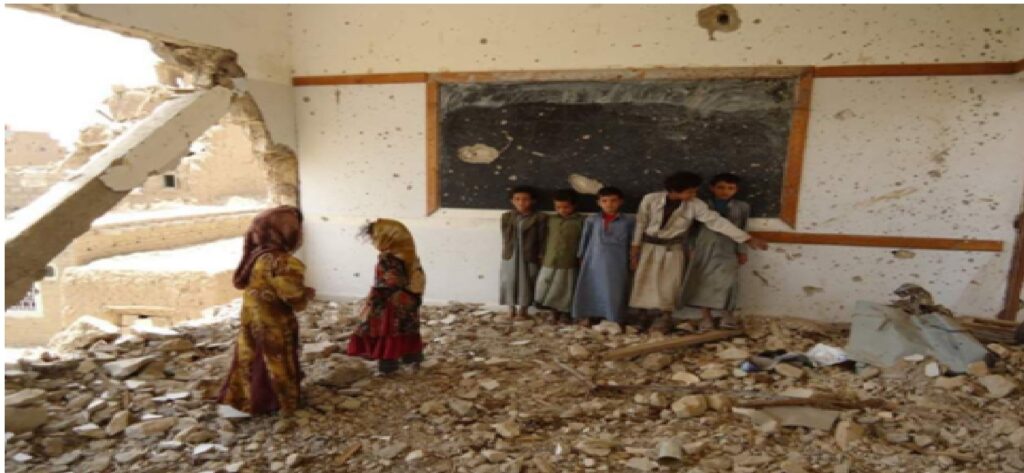
Picture taken from: Islam Times
The Saudi led coalition has destroyed over 3000 schools in the country in the past years

